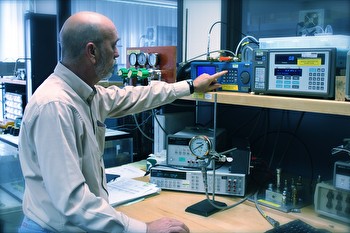

Metrology is defined by the International Bureau of Weights and Measures (BIPM) as "the science of measurement, embracing both experimental and theoretical determinations at any level of uncertainty in any field of science and technology." The ontology and international vocabulary of metrology (VIM) is maintained by the International Organisation for Standardisation.
A core concept in metrology is metrological traceability, defined by the BIPM as "the property of the result of a measurement or the value of a standard whereby it can be related to stated references, usually national or international standards, through an unbroken chain of comparisons, all having stated uncertainties." The level of traceability establishes the level of comparability of the measurement: whether the result of a measurement can be compared to the previous one, a measurement result a year ago, or to the result of a measurement performed anywhere else in the world.
Traceability is most often obtained by calibration, establishing the relation between the indication of a measuring instrument and the value of a measurement standard. These standards are usually coordinated by national metrological institutes: National Institute of Standards and Technology, National Physical Laboratory, UK, Physikalisch-Technische Bundesanstalt, etc.
Traceability is used to extend measurement from a method that works in one regime to a different method that works in a different regime, by calibrating the two using an overlapping range where both work. An example would be the measurement of the spacing of atomic planes in the same crystal specimen using both X-rays and an electron beam. Traceability also refers to the methodology used to calibrate various instruments by relating them back to a primary standard. Traceability, accuracy, precision, systematic bias, evaluation of measurement uncertainty are critical parts of a quality management system.
Calibration is a comparison between measurements - one of known magnitude or correctness made or set with one device and another measurement made in as similar a way as possible with a second device.
The device with the known or assigned correctness is called the standard. The second device is the unit under test, test instrument, or any of several other names for the device being calibrated.